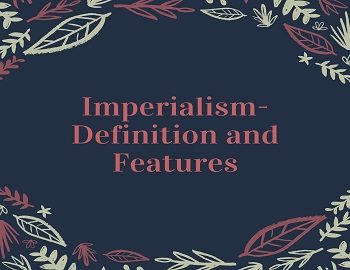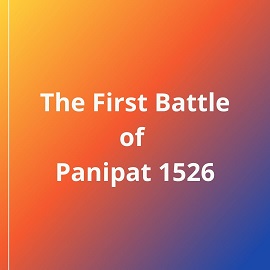Table of Contents
Definition of Imperialism:
Imperialism means the subjugation of one country by another country or countries by fair or foul means. Under Imperialism, the dominated country loses its freedom. The life of the people of the colonies is not directed according to their interests. The importance is rather attached to the interests of the Imperialist power. The Imperialist Country establishes her hold on the economy of the dominated country along with extending the political domination over it. The main aim of the imperialist power is to exploit the people, the resources and the trade of the subjugated country for the benefit of their industrialists. They spread their language, religion and culture in the occupied lands. For example- before 15th August 1947 A.D., such a condition was prevailing in India.
Main Features of Imperialism:
The chief characteristics of imperialism are as follows-
- The native states are brought under the political dominance of the colonial powers.
- The policy of social discrimination is intentionally followed by the ruling powers to show off their superiority.
- There is the economic exploitation of the resources of the colonies for the benefit of Imperial powers.
- Civilizing missions are given the liberty to work in colonies by imperial powers.
- War and conflicts are the pre-requisites of imperialism.
Industrial Revolution led to the Emergence of Imperialism:
The Industrial Revolution encouraged and abetted the European powers to follow the imperialistic policy in different countries of Asia and Africa in several ways-
- Demand of markets for surplus production- The Industrial Revolution led to the establishment of large scale industries that began to manufacture goods in large quantities. The goods thus produced were so abundant that they needed markets in other countries. Such markets were available to them only in Asian and African countries where industrialization had not yet taken place.
- Cheap Raw-Material- European countries needed more and more raw-material to feed their industries which they could get only from Asian and African countries. The European powers thought that the political occupation of these countries would ensure the regular supply of raw material at cheaper rates.
- To invest surplus capital- Several European capitalists were eager to invest their surplus capital in the Asian and African countries so that they could have not only a cheap and abundant supply of raw material but also cheap labour. For the safeguard of their investment and people, they exercised political control over the colonies. Capital invested in Europe would fetch only 3 or 4 per cent profit; in Asia or Africa, it was as high as 20 per cent.
- Better Means of Transport and Communication- The startling improvement in the means of transport and communications in the 19th century made the growth of imperialism easier. It helped in the spread of imperialism since the whole world came in easy reach of the industrialized countries. Steamships could carry goods between home counties in Europe and the acquired territories in Asia and Africa much faster than old sailing vessels.









Comments (No)